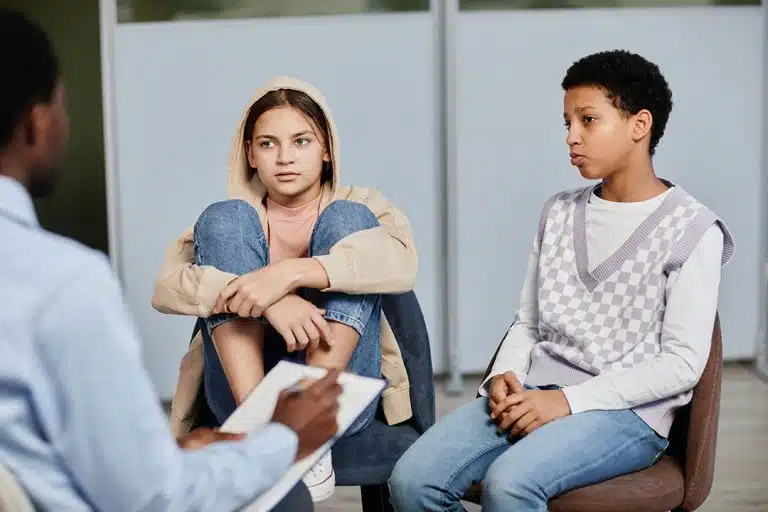our services
Teen Counselling
Teen Counselling
Does your teenager have trouble dealing with their emotions? Is their behavior sometimes disruptive to your home life? Have they experienced sudden loss or trauma?
As they grow, teenagers develop social skills and emotional intelligence. This awareness helps them to develop into healthy, happy, and successful individuals. But some teenagers have trouble processing their emotions and this often leads to behavior that negatively impacts their school life, home life, and overall well-being.
Effective Forms of Therapy for Teenagers.
Therapy offers teenagers a safe space to work through their thoughts and emotions. With the help of a specialized therapist, teenagers can resolve problems, modify behaviors, and make positive and lasting changes.

Teenagers face with life’s challenges. The following are some of the events and scenarios that can impact a teenager’s mental health and well-being:
- The death of a loved one
- Bullying
- Physical or sexual abuse
- Domestic violence
- Moving or attending a new school
- Divorce
- Social anxiety
- Depression
- ADHD
- Eating disorders
Therapy is not a quick fix to a teenager’s behavioral or emotional issues. It is instead a thoughtful and comprehensive process that provides children with insights and skills so that they may become masters of their thoughts and feelings. This, in essence, is how children develop into happy, healthy, and successful adults.
If you would like to explore treatment options for your teenager, please reach out today!
Lots of teenagers have problems that affect how they feel, think, or act. Therapy is a way to get help with these problems. If you go to therapy, you’ll meet with a therapist (sometimes called a counsellor, feelings helper, emotion coach) to talk and learn. Therapy helps kids learn to cope better, communicate better, and do better in all areas of their life.
If you’re dealing with a problem, your parent or doctor might suggest you go to a therapist. Or it might be your idea. You might be the one to ask your parent to take you to a therapist.
Therapists are trained to help teenagers with all kinds of problems.
They help teenagers going through tough times like:
- family problems
- school problems
- bullying
- health problems
They help teenagers with feelings like:
- sadness
- anger
- stress and worry
- low self-esteem
- grief
They help teenagers with conditions like:
- ADHD
- depression
- OCD and anxiety
- disruptive behavior disorders
- trauma-related disorders
Teenagers need therapy when they have problems they can’t cope with alone. Therapy helps them talk about their feelings and learn new skills. It helps them work out their problems. As this happens, teenagers start to try new skills and do better.
In therapy, teenagers learn by talking and doing. Therapists do activities with teenagers that teach skills. Teenagers learn to use these skills to solve problems. A therapist gives praise and support as teenagers learn. This helps teenagers do their best and feel proud of the work they are doing.
At first, your therapist will talk with you and your parent(s). Therapists ask questions and listen. This helps them learn more about you. The therapist will tell you how they can help.
When the therapist knows you better, the two of you might:
Talk. Talking is a healthy way to express feelings. Teenagers are more ready to learn when someone listens to how they feel.
Play and draw. Therapists use games that teach things like taking your time on schoolwork or other tasks. Some games teach kids how to try again instead of giving up. Drawing can teach about feelings.
Do activities. Therapists might teach lessons about feelings, coping skills, or facing fears. Activities help make these lessons more fun.
Practice new skills. A therapist might teach you skills like mindfulness and calm breathing. These take practice. Therapists help you practice what you’re learning.
Solve problems. Your therapist will ask about how problems affect you at home and at school. They will talk with you about how to solve these problems
How long therapy lasts depends on your problem and what you need. Most of the time, a therapist will want to meet with you once a week for a few months.
If you’re going to a therapist, here are some ways to help yourself too:
Be ready to grow. Tell yourself “I can” instead of “I can’t.” This helps you do your best.
Ask your family for help when you need it. Share how you feel. This helps you feel close.
Do things you are good at and enjoy. This gives you confidence.
Know your good qualities. Maybe you are funny, creative, helpful, or kind. Use at least one of these every day. This helps you be your best self.
Find time to play and have fun. Being active every day helps you feel happier and ready to learn
Book An Appointment









